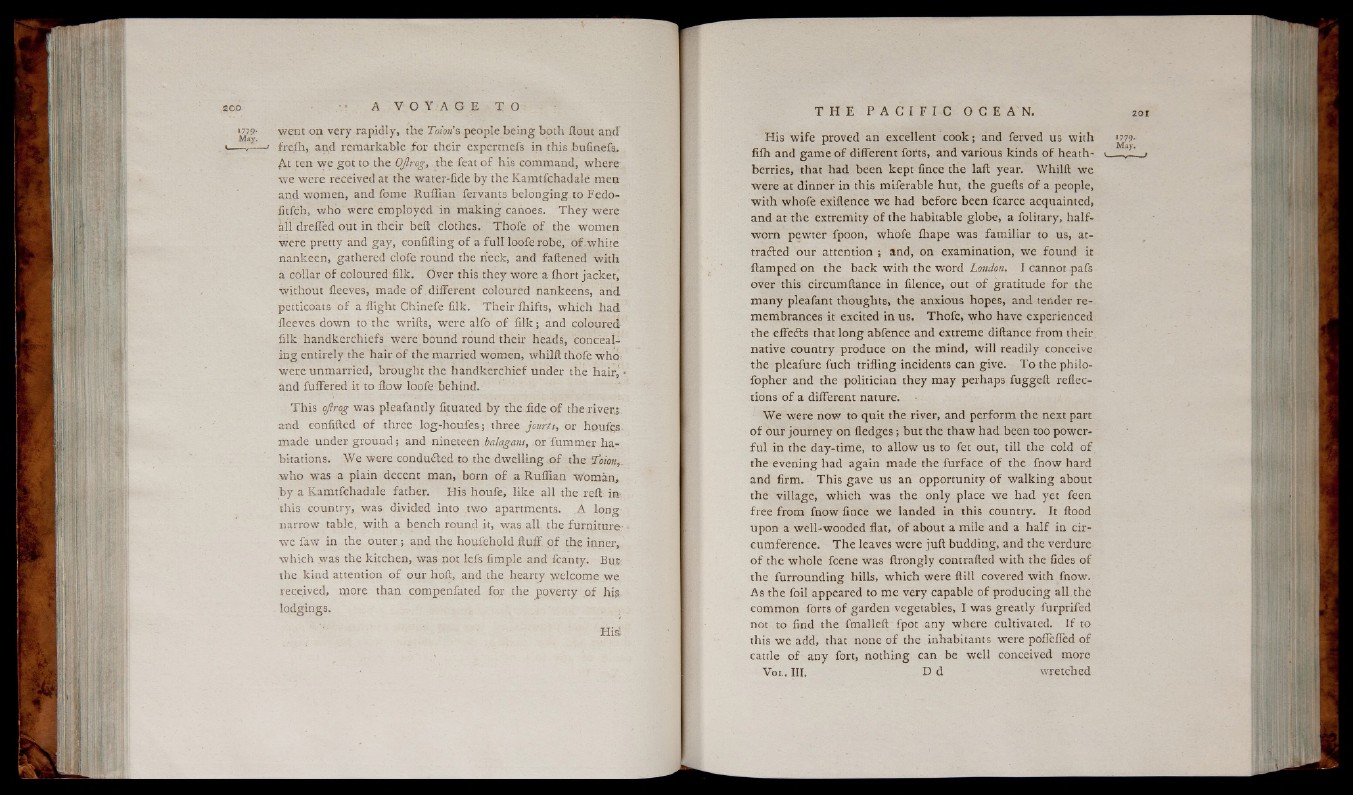
J779- went on very rapidly, the Toioris people be in g both flout and
—v-— i frefli, and remarkable for their expertnefs in this bufinefs.
At ten we got to the OJirog, the feat o f his command, where
w e were received at the water-iide by the Kamtfchadale men
and women, and fome Ruflian fervants belonging to Fedo-
fitfch, w ho were employed in m a k in g canoes. T h e y were
all dreffed out in their beft clothes. Thofe o f the women
were pretty and ga y, eoniifting o f a fu l l loofe robe, o f .white
nankeen, gathered clofe round the heck, and fattened w ith
a collar o f coloured filk. Over this they wore a ihort jackerj
without fleeves, made o f different coloured nankeens, and
petticoats o f a flight Chinefe filk. The ir ihifts, which had
fleeves down to the wrifts, were alfo o f f i lk ; and coloured
filk handkerchiefs were bound round their heads, concealin
g entirely the hair o f the married women, whilft thofe who
were unmarried, brought the han dke rchie f under the hairj ■
and fuffered it to flow loofe behind-
T h is ojirog was pleafantly fituated by the fide o f the rivers,
and confifted o f three log-hou fes; three jourts, or hpufes
made u n d e rg ro u n d ; and nineteen balagans, or fummer habitations.
We were condudled to the dw ellin g o f the Xoion,,
.who was a plain decent man, born o f a Ruflian woman,
b y a Kamtfchadale father. His houfe, lik e a ll the reft in
this country, was divided into two apartments. A long'
narrow table, with a bench round it, was all the furniture-
we faw in the o u te r ; and the houfehold f lu f f o f the inner,
which was the kitchen, was not lefs fimple and fcanty. But:
the kind attention o f our hoft, and the hearty welcome we
received, more than compenfated for the poverty .of his
lodgings.
Hisl
His w ife proved an excellent co o k ; and ferved us with >779-
fiih and game o f different forts, and various kinds o f heath-
berries, that had been kept fince the laft year. Whilft we
were at dinner in this miferable hut, the guefts o f a people,
w ith whofe exiftence w e had before been fcarce acquainted,
and at the extremity o f the habitable globe, a folitary, h a lf worn
pewter fpoon, whofe ihape was familiar to us, attracted
our attention ; and, on examination, we found it
ftamped on the back with the word London. I cannot pafs
over this circumftance in filence, out o f gratitude for the
many pleafant thoughts, the anxious hopes, and tender remembrances
it excited in us. Thofe, who have experienced
the effedts that lon g abfence and extreme diftance from their
native country produce on the mind, w ill readily conceive
the pleafure fuch trifling incidents can give. T o th e p h ilo -
fopher and the politician they may perhaps fuggeft reflections
o f a different nature.
We were now to quit the river, and perform the next part
o f our journey on fled g e s ; but the thaw had been too powerfu
l in the day-time, to allow us to fet out, till the cold o f
the evening had again made the furface o f the fnow hard
and firm. T h is gave us an opportunity o f w a lk in g about
the village, w h ich was the only place w e had yet feen
free from fnow fince w e landed in this country. It flood
upon a well-wooded flat, o f about a mile and a h a lf in circumference.
T h e leaves were juft budding, and the verdure
o f the whole fcene was ftrongly contrafted with the fides o f
the furrounding hills, w hich were ftill covered w ith fnow.
As the foil appeared to me ve ry capable o f producing all,the
common forts o f garden vegetables, I was grea tly furprifed
not to find the fmalleft fpot any where cultivated. I f to
this w e add, that none o f the inhabitants were pofieffed o f
cattle o f any fort, nothing can be well conceived more
V o l . III. D d wretched